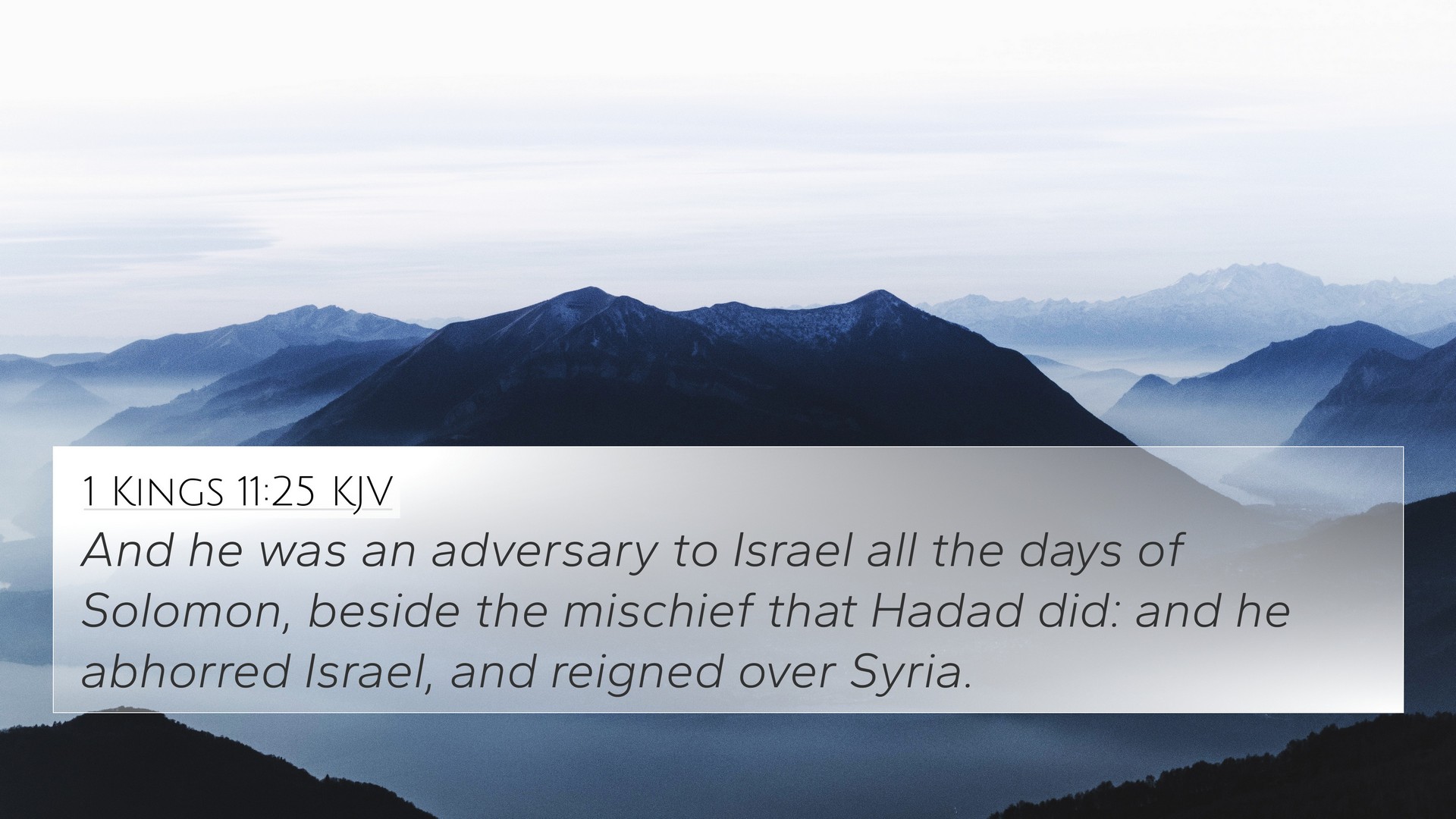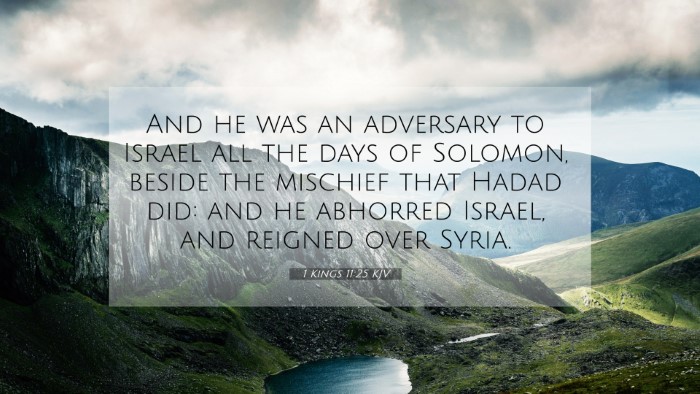Understanding 1 Kings 11:25
The verse 1 Kings 11:25 states: "And he was an adversary to Israel all the days of Solomon, beside the mischief that Hadad did: and he abhorred Israel, and reigned over Syria."
This verse introduces a significant figure, Hadad the Edomite, who played an adversarial role during King Solomon's reign. To fully appreciate the implications of this verse, we can explore various commentaries that delve into its meaning and context.
Exegesis and Commentary Insights
-
Matthew Henry:
In Henry's commentary, he emphasizes the divine providence that allows adversaries to arise, serving God’s purpose in correction and judgment. Hadad's antagonism towards Israel is portrayed as a reminder of the consequences of Solomon's unfaithfulness, particularly his idolatry. The presence of enemies often mirrors the spiritual condition of God's people.
-
Albert Barnes:
Barnes notes that Hadad was a significant enemy of Israel, highlighting the broader theme of political instability. The mention of mischief suggests that his opposition was not merely personal but rooted in a divine narrative that accounts for the disobedience of Israel's leaders. This verse illustrates how external conflicts often arise from internal spiritual failures, reflecting God's judgment against unfaithfulness.
-
Adam Clarke:
Clarke points out that Hadad's lineage and the motives behind his enmity are essential to understanding his role. The commentary elaborates that his hatred for Israel reflects the ongoing friction between the Edomites and Israelites, a relationship deeply rooted in historical conflicts. Clarke also emphasizes the broader implications of allowing adversaries, as they reveal God's justice and the need for righteous leadership.
Cross-References
To deepen our understanding of 1 Kings 11:25, we can examine the following Bible cross-references that highlight similar themes of conflict, divine judgment, and adversarial relationships:
- 1 Kings 11:14: The Lord raised up adversaries against Solomon; this sets the stage for understanding Hadad's role.
- 1 Kings 11:16: Details on how the Edomites had been under oppression, which culminates in Hadad's rise as an adversary.
- 2 Samuel 8:14: Discusses David's victories over Edom, connecting to Hadad's continued hostility.
- Exodus 17:16: Reflects on the ongoing enmity between God’s people and their adversaries.
- 1 Kings 11:23: Introduces another adversary, Rezon, emphasizing the theme of external threats to Israel.
- Isaiah 34:5-6: Contains prophetic imagery about God's judgment on nations, including Edom.
- Psalm 60:8: Reflects Israel's historical conflicts with Edom, providing historical context to Hadad's animosity.
Thematic Connections
The themes present in 1 Kings 11:25 not only focus on conflict but also weave into the larger narrative arcs of divine justice, leadership accountability, and the consequences of idolatry. These connections can be identified as:
- Spiritual Warfare: The external conflicts faced by Israel serve as a reflection of their internal spiritual state.
- Divine Justice: Adversaries like Hadad are often manifestations of God’s reproof against His people's unfaithfulness.
- Leadership Accountability: Solomon's failures lead to the rise of adversaries, underlining the weight of a leader's choices.
Links to Related Themes
Understanding 1 Kings 11:25 in the broader scope of scripture can enhance one's grasp of God's overarching narrative. Consider how similar themes and motifs appear in other parts of the Bible:
- Conflict with the Edomites connects to the larger theme of Israel's struggle against surrounding nations, as seen in Deuteronomy 2:4-5.
- Adversaries arising as instruments of divine judgment echoes throughout scripture, particularly in Jeremiah 11:12-14.
- Political instability in leadership has parallels in 2 Chronicles 34:5-6, where idolatry leads to national decline.
Conclusion
1 Kings 11:25 serves as a poignant reminder of the repercussions of turning away from God, illustrated through the figure of Hadad. The insights drawn from public domain commentaries enrich the interpretation, while the suggestions for cross-referencing related verses provide tools for deeper biblical study. Engaging with these connections allows for a comprehensive understanding of scripture, demonstrating the intricate tapestry of God's narrative woven through time.









